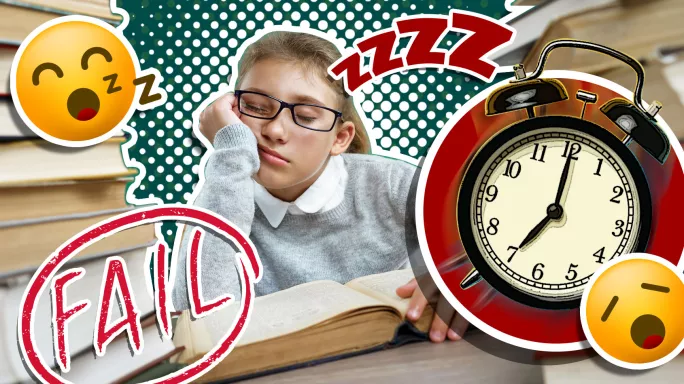
- Home
- Teaching & Learning
- Secondary
- Do later starts improve attainment?
Do later starts improve attainment?

In July, a law came into effect in California that delighted teenagers across the state. In a first for the US, legislation was passed that banned high schools from starting lessons earlier than 8.30am, and middle schools from earlier than 8am.
The decision was based on decades of research that proves teenagers biologically need to go to sleep later, and sleep for longer, than younger children or adults (see box, below).
As our understanding of the science of teenage sleep has grown, calls to delay secondary school start times have become louder, with many working on the assumption that this could boost academic performance.
But is there robust evidence to support a link between later start times and higher attainment?
The importance of sleep
Research in this area is limited, context specific and mostly international.
In 2011, the University of California published a paper that looked at the difference in achievement over three years between 18-year-old students studying at the United States Air Force Academy (USAFA), who had their first lesson at 7am, 7.30am or 7.50am, and those who started later.
They found that students who started before 8am performed “significantly worse” throughout the day than their peers.
The researchers concluded that starting the school day 50 minutes later appears to have a significant positive effect on student attainment, which is “roughly equivalent to raising teacher quality by one standard deviation”.
This study does have limitations; the students were university age, and not in pre-16 education. However, the authors believe the findings to be applicable to secondary schools because the study involved freshmen (first-year students).
Other studies from the US include a paper published in 2012 by Finley Edwards, a professor in the economics department at Colby College in Maine, which analysed data on all middle school students (the equivalent of Years 7-9 in England) in Wake County, North Carolina, between 1999 and 2006. Edwards found that starting school one hour later leads to a 2 percentile-point gain in maths test scores.
While there is less research published in the UK, there is one paper from 2017 that looked at a range of benefits of later start times in an English secondary school, including academic progress.
The researchers, from Open University, Harvard University and the University of Nevada, conducted a four-year observational study in a secondary school in England, which saw start times shift from 8.50am to 10am across two academic years, before shifting back to 8.50am.
They measured how student health (indicated by the number of recorded absences due to illness) and academic performance (indicated by national examination results) changed across the four years. They concluded that implementing a 10am start saw a “decrease in student illness after two years of 50 per cent, and reverting to an 8.50am start reversed this improvement, leading to an increase of 30 per cent in student illness”.
When it came to academic progress, the researchers said that “the 10am start was associated with a 12 per cent increase in the value-added number of students making good academic progress (in standard national examinations) that was significant, and equivalent to 20 per cent of the national benchmark”.
‘It’s about children’s health. If we’re only looking at whether grades improve, we could be missing a big benefit’
Writing for Tes in 2020, neuroscientist Jared Cooney Horvath gives an indication of why this might be. He suggests that allowing teens to sleep later could allow them to spend more time in the phase of sleep called “stage-2 sleep”, which he explains “occurs primarily during later sleep cycles” and is “essential for memory formation”.
Unfortunately, he continues, partly because of school start times, “most teenagers don’t spend a lot of time in this stage-2 sleep”.
“This almost certainly impairs memory formation during adolescence,” he says.
On the flipside, if teenagers slept in later, their memory function would likely improve, which, in turn, could support better learning.
So, can we conclude that later start times do have a positive impact on grades?
According to Anna Biller, a postdoctoral researcher in the chronobiology and health group at the Technical University of Munich, it isn’t quite that straightforward. Biller is a sleep expert and earlier this year she published a review of the international evidence in this area.
With her colleagues, Biller reviewed 21 studies, all of which looked at secondary school start times in connection with grades or standardised test scores, and assessed the evidence quality using a risk of bias tool.
She found that nine studies reported no association of later starts with attainment, five reported mixed association, five positive, one negative, and one reported an unclear association.
Overall, then, she finds the evidence picture is mixed - as was the quality of the studies she reviewed.
“The study quality was very mixed and, in general, only moderate, so we can’t really draw conclusions from poorly designed studies,” she says.
The bigger picture
However, this isn’t to say that later starts should be written off completely, she stresses.
“In most of the studies that also look at sleep outcomes, at least short term, these adolescents usually get more sleep when you delay start times. So if you look at it from that perspective, I think that’s actually a success because you’re giving them a benefit of sleeping for longer, and being potentially healthier,” she says. “Crucially, as well, they don’t get worse grades.”
If you look at attainment alone as the measure of whether later start times make sense, you miss a big part of the picture, she adds - particularly considering there are so many factors that can influence grades, including “class sizes, teacher relationship, socioeconomic background [and] prior knowledge”.

Separating the effects of these factors from start times is obviously tricky, and so, Biller says, it’s important we don’t disregard the other potential benefits of later starts.
“If you think about what we actually want the children to experience, it’s also about their mental health, their physiological health. If we’re only looking at whether grades improve, we could be missing a big benefit of later start times.”
Cooney Horvath likewise cautions against using grades as the sole marker against which to measure the worth of later starts.
Although “there does not appear to be a correlation between school start time and standardised test performance”, he points out that “delayed starts may impact the type of deep, sustained learning commonly favoured within classrooms but rarely tested on national or international exams”.
“Furthermore, research has demonstrated a negative correlation between delayed school start time and student absence and tardiness,” he adds.
So, even if later starts do not directly impact learning, there is evidence that they may make students more likely to turn up to school, and turn up on time.
‘We have to think about if it’s worth changing the entire system’
Ultimately, though, more longitudinal data is needed to draw firm conclusions, Biller stresses.
“If we had longer, bigger studies with more students, a really good design and a really good statistical analysis, maybe we would find some improvements,” she says.
“But then, of course, we have to think about the level of relation and improvement: if it’s meaningful and worth changing the entire system.”
It’s important to get a clear picture here, because later starts have an impact not only on the students but on everyone else in the school. And while teenagers might be biologically suited to getting up later, the same can’t be said for their teachers - particularly those with young children of their own.
Any adjustment to start times, then, needs to be carefully weighed by school leaders.
In 2018, researchers at the University of Oxford attempted a large randomised controlled trial, which might have gone some way towards providing more extensive data that would help to inform that thinking.
The team wanted to evaluate the impact of two school interventions (a delayed start time and a sleep education programme) on students’ academic performance, sleep outcomes and health-related quality of life.
The recruitment target was 100 state schools in the UK but, despite media coverage, just two schools volunteered.
The researchers identified that the main challenges were: research design, school and project-specific issues and that, from the schools’ perspective, “the delayed start time and prospect of randomisation to this intervention were the overwhelming reasons cited for not taking part”.
They concluded: “The Teensleep study provides supporting evidence that evaluating the effects of a change in school start times through an RCT is unfeasible in the UK”.
To return to our original question, then: do later starts boost grades? We can’t say for sure, and as long as large-scale trials in this area remain impossible to carry out, it’s unlikely we will get a definitive answer any time soon.
However, what is clear from the research is teenagers’ sleep patterns differ from adults’, and the more sleep they can get, the better.
And for Biller, there is one key takeaway for schools from the existing research: later start times certainly don’t worsen grades.
You need a Tes subscription to read this article
Subscribe now to read this article and get other subscriber-only content:
- Unlimited access to all Tes magazine content
- Exclusive subscriber-only stories
- Award-winning email newsletters
- Unlimited access to all Tes magazine content
- Exclusive subscriber-only stories
- Award-winning email newsletters
You need a subscription to read this article
Subscribe now to read this article and get other subscriber-only content, including:
- Unlimited access to all Tes magazine content
- Exclusive subscriber-only stories
- Award-winning email newsletters
- Unlimited access to all Tes magazine content
- Exclusive subscriber-only stories
- Award-winning email newsletters
topics in this article



